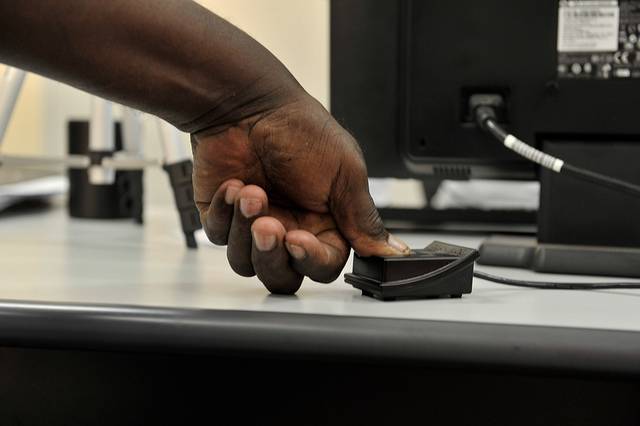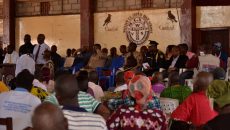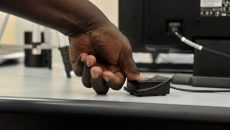In 2011, the Government of Liberia created the National Identification Registry, an autonomous agency that would be responsible for developing and administering a National Biometric Identification System for all citizens and residents of the Republic of Liberia. This is no small undertaking, but six years later, NBIS is almost a reality.
About this time last year, the executive director of the National Identification Registry, J. Tiah Nagbe said that the use of upcoming biometric ID cards was being considered for the 2017 elections. At the time, he explained that the rollout of the biometric ID cards would likely take place in three phases:
- Phase 1 — Setting up the national biometric data center, printing facilities, and enrollment centers.
- Phase 2 — Mass enrollment of citizens.
- Phase 3 — Linking the NIR system with other institutions that require NIR information for their work.
Front Page Africa earlier reported on the launch of biometric ID cards in Liberia with registration expected to begin in October. Nagbe held a press conference announcing the program and explaining that every Liberian would need to obtain a national ID card.
According to the Front Page Africa report, each biometric ID card would have a unique identification number assigned to it along with an embedded chip containing all personal identification. While having a national ID card in order to register to vote and interact with various government agencies has been expected, Nagbe said that the card would be used to open bank accounts or even register a SIM card.
The National Biometric Identification System been in the works for years and is now getting closer to becoming a reality this fall. However, while this is a much-needed program, there are concerns about its readiness. For example, when the enrollment process begins, Nagbe expects the program to enroll 50 Liberians a day. At that rate, that’s only 18,250 people per year — in a country of 4.7 million.
Liberians have raised questions as to the cost — their own out-of-pocket cost to obtain an ID. The contract between the NIR and its contractor, Techno Brain Global FZE, is for three years at a cost of US$5.9 million, but the individual cost per ID card has yet to be announced.
NIR Deputy Director for Technical Services, Zeze Reed, said the agency has recommended a charge of at least US$5.00 (or its Liberian Dollar equivalent) for the identification card to be paid by each citizen and legal resident.
“The price has not been decided because we at the NIR are not the decision makers; we only suggest to the cabinet,†Reed said in an interview.
“The government is paying for this project and could decide that the card is issued at no cost or not; that’s a policy decision. But from our end, we are saying that the card should not be free because of the cost of production, but the exact amount has not been decided.â€
He said NIR and its contracting partner are currently working on the system’s requirement specification to determine its functional requirements.
“After this is done and approved, then we’ll start the design of the system,†he disclosed. According to him, the card will be issued to both Liberian citizens and legal residents.
Reed said the NIR will manage and control personal data submitted to the system at its office, securing it with a highly confidential security system. Data provided, he said, would be used to enhanced government planning and the execution of different functions.
He also explained that with the system’s biometric fingerprint and other security features, no single person would be recognized more than once by the system and that there would be no room for forgery.
“Identity is fixed for life, and even if the legal name associated with it is changed, it can be traced to its original,†he assured.
The cards are expected to be changed after the first three years to update their security and technology features and then maintained for another five years before another change.
According to Reed, for the first phase of enrollment, the NIR will establish eleven permanent centers across the country, with five mobile teams each enrolling citizens and legal residents in cities, towns, and villages.
“Phase two will be mass enrollment, similar to voter registration, but would be done one region at a time,†he added.
He said that the country’s database would be housed by the NIR. They will also have a data recovery center, but its location will not be disclosed to the public for security reasons.
“That will be our backup, in case we have a problem or lose our data here,†he noted.
People who need to access personal data will need to be authorized, depending on the protocols in place, Reed said.
“For example, if a bank wants to identify you, the bank could tap into our database but according to the policy that will be arranged NIR and that institution,†he explained.
He said police and telecommunications companies would also be potential users of personal data, depending on requirements that would be arranged for authorization. That data, however, will be provided in an encrypted form.
Rolling out a program of this scope is a huge undertaking, requiring careful consideration, planning, technology, and security protocols. From the sound of it, the kinks are being worked out and the program is nearly ready.
Gbatemah Senah contributed to this article. Featured photo by AU UN IST PHOTO/Tobin Jones



